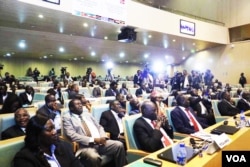More foreign troops arrived in South Sudan's capital as part of the U.N. Security Council-mandated Regional Protection Force (RFP). But a South Sudanese analyst says the additional peacekeepers will have no impact on the country's deadly conflict if they are not deployed outside of Juba.
The 270 Rwandans who arrived on Saturday join about 600 other personnel from Bangladesh, Ethiopia, Pakistan and Rwanda. Francesca Mold, a spokeswoman for the U.N. Mission in South Sudan (UNMISS), said more Rwandans are coming by road, and the force will eventually grow to 4,000.
The Security Council mandated in 2016 the RPF provide protection to key facilities and routes in Juba and to strengthen the security of U.N. Protection of Civilians' sites, where thousands of displaced South Sudanese have been living after fighting broke out in their towns and villages.
Policy analyst Augustino Ting Mayai at the Juba-based Sudd Institute said the capital is stable, so there is no reason for the newly arrived troops to stay in Juba.
"It makes less sense that you add 200 more troops to what we have already in Juba — the U.N., the Regional Protection Forces, the government security forces, the police, and other forces," he told VOA's South Sudan in Focus. "It just doesn't make any sense."
In August, UNMISS chief David Shearer said the arrival and phased deployment of the RPF would free existing UNMISS peacekeepers to extend their presence to conflict-affected areas outside of Juba.
He said there were delays in deploying the protection forces because that requires the cooperation of the South Sudan government, troop contributing countries, and U.N. headquarters to make sure all procedures are followed.
And before more troops are sent to South Sudan, he said the U.N. should re-evaluate the performance of UNMISS and the kind of protection that is required in the country.
"Is it the protection for big installations? Is it the protection of political leaders or is it a general protection of civilians?," he asked. "... Civilians come first because it is a majority of them who are getting displaced, who are walking to nearby nations bordering South Sudan where a majority of people have been killed."
Addis Ababa talks
Mayai said parties attending talks in Addis Ababa to revitalize South Sudan's 2015 peace agreement should discuss whether a Regional Protection Force in South Sudan is even a good idea at this point.
"The agreement should come up clearly on whether or not such a force is needed, and if needed, where exactly we should deploy them to provide that protection that it is desired," he said.
Tensions flared with government forces after RPF troops were deployed near Juba airport in August. Mayai said with more RPF troops arriving in South Sudan, the government and the U.N. should improve their coordination to prevent a repeat performance of that incident.
"We need to streamline how a message is passed between the government and the international community, and that the community are made aware of the coming of troops so that they don't cause panic when people see them for the first time," he added.
The U.N. Security Council authorized the Regional Protection Force for South Sudan after deadly violence broke out in Juba between government forces and bodyguards of former first vice president Riek Machar.
Along with the Rwandan troops that arrived last week, the current RPF includes a company of Rwandan soldiers, a Nepalese company, and slightly more than 100 Bangladeshi engineers.









